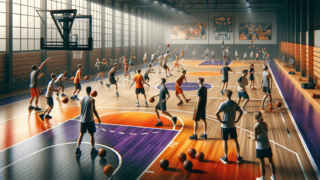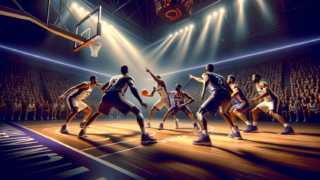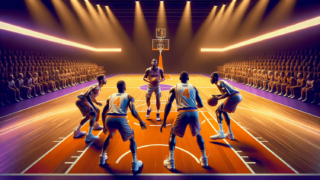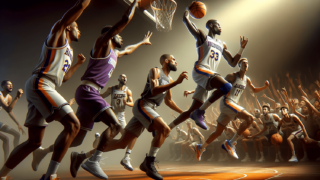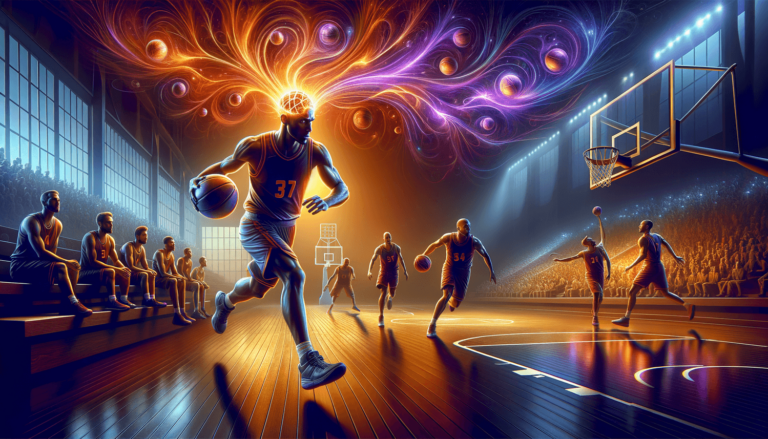
If you’re passionate about basketball, then you understand that success on the court is as much a mental challenge as it is a physical one. Developing your basketball mental game is crucial for unlocking your full potential and performing under pressure. In this blog post, we’ll dive deep into the mental aspects of the sport, offering essential tips, strategies, and techniques that will help you cultivate a strong and resilient mindset. Along the way, we’ll share interesting stories and insights from top players and coaches that illuminate the importance of mental preparation. Whether you’re a seasoned veteran or a budding hoops star, get ready to elevate your game to new heights with these powerful mental tools.
How to Develop Your Basketball Mental Game?
To develop your basketball mental game, focus on building confidence, setting goals, maintaining a positive attitude, visualizing success, managing emotions, and improving concentration. Incorporate mental training exercises into your routine, such as meditation, journaling, and mindfulness techniques, to strengthen your psychological resilience and overall performance on the court.
1. Building Confidence on the Court
Confidence is key when it comes to basketball performance. A player with confidence in their abilities is more likely to take risks and make decisive plays. To develop your basketball mental game, consider the following tactics:
A. Track Your Progress
Regularly evaluate your skills and take note of the areas where you excel and those which require improvement. By measuring your progress, you’ll gain a better understanding of your strengths and become a more confident player.
B. Focus on Positives
Instead of dwelling on missed shots or poor decisions, concentrate on the positive aspects of your performance. Celebrate milestones, personal records, and even smaller achievements that illustrate your growth as a player.
C. Learn from Defeats
Instead of letting a loss weigh heavily on your mind, use it as an opportunity for growth. Analyze your performance, identify areas for improvement, and work on those aspects during your next practice session.
2. Goal Setting
Setting both short- and long-term goals helps you maintain focus and motivation, pushing you to strive for excellence. Here’s how to set effective basketball goals:
A. SMART Goals
Ensure your goals are Specific, Measurable, Achievable, Relevant, and Time-bound (SMART). For example, instead of “improving your shooting accuracy,” aim for “increasing your free-throw percentage by 10% within the next 3 months.”
B. Break Down Goals
Dividing your larger goals into smaller, manageable objectives allows you to track progress, celebrate achievements, and maintain motivation. For instance, breaking down a goal to improve your dribbling skills into weekly sessions focusing on dribbling drills, ball handling, or a crossover move.
C. Reevaluate Regularly
Regularly assess your progress and adjust your goals accordingly. Be open to refining or changing your goals if necessary, and don’t be afraid to set new targets if you surpass your expectations.
3. Cultivating a Positive Attitude
A positive attitude boosts self-esteem, facilitates teamwork, and helps you bounce back after setbacks. Here are some tips to develop a positive attitude:
A. Embrace a Growth Mindset
A growth mindset emphasizes constant improvement and effort, believing that skills and intelligence can be developed through dedication and hard work. View challenges as opportunities to learn, grow, and push your boundaries.
B. Use Positive Self-Talk
Encourage yourself through positive self-talk, reminding yourself of your accomplishments, preparations, and capabilities. Replace negative thoughts with affirmative statements that inspire action and self-belief.
C. Surround Yourself with Positivity
Create a positive environment by surrounding yourself with supportive teammates, coaches, and friends who believe in your potential and push you to be your best on and off the court.
4. Visualization Techniques
Visualization, also known as mental imagery, involves mentally rehearsing situations before they occur. Studies show that visualization can improve athletic performance and build mental strength. Follow these steps to harness the power of visualization:
A. Find a Quiet Place
Choose a calm, quiet space where you can focus intently on your mental images without distractions. Ensure that you’re comfortable and relaxed before beginning the visualization process.
B. Use Your Imagination
Imagine yourself performing at your best, executing perfect moves, and making game-winning shots. Vividly picture the basketball court and your surroundings. Use your senses to create a lifelike mental representation of the game.
C. Rehearse Specific Scenarios
Practice visualizing various game situations, such as sinking a last-second buzzer-beater or nailing a pressure-packed free throw. By mentally rehearsing these scenarios, you’ll be better prepared when they arise in actual games.
5. Emotion and Stress Management
Keeping emotions and stress under control is crucial for basketball success. Here are some techniques for managing emotional responses on the court:
A. Recognize Your Triggers
Identify the situations, thoughts, or feelings that lead to negative emotional reactions, such as frustration or anger. Recognizing these triggers allows you to respond proactively and regain control over your emotions.
B. Practice Deep Breathing
Deep breathing helps regulate stress, calm nerves, and increase focus. When feeling overwhelmed or agitated, pause for a moment, take a few deep breaths, and gradually return to a relaxed state.
C. Develop Coping Strategies
Prepare a set of coping strategies, such as repeating a calming mantra or focusing on a specific aspect of the game that redirects your energy from negative emotions to productive actions.
6. Enhancing Concentration and Focus
Strong concentration is essential for basketball success, ensuring you’re fully engaged and present in each moment of the game. Here are some strategies to sharpen your focus:
A. Mindfulness Techniques
Mindfulness involves the practice of paying attention to your thoughts, feelings, and bodily sensations in the present moment without judgment. Incorporate mindfulness exercises like meditation or yoga into your routine to improve focus and mental clarity.
B. Limit Distractions
Identify potential distractions and take measures to minimize them during games and practice sessions. If possible, create a dedicated basketball environment that allows you to concentrate exclusively on the game.
C. Develop a Pre-Game Ritual
Create a pre-game routine that prepares your mind and body for optimal performance. Routines can include listening to music, reviewing game plans, deep breathing exercises, or engaging in visualization techniques.
In conclusion, while the physical aspects of basketball are crucial, developing your mental game can set you apart from your competitors. By implementing these strategies and consistently practicing mental training, you’ll gain a competitive edge that takes your basketball game to its full potential.
7. Effective Communication and Teamwork
High-performing basketball teams rely on effective communication and teamwork to secure victories. Cultivating these skills is integral to your mental game development:
A. Active Listening
Focus on listening carefully to your teammates and coaches, understanding their perspectives, and responding appropriately. Active listening enhances trust, cooperation, and overall team performance.
B. Communicate Clearly and Concisely
Ensure you convey information on the court in a clear, concise, and timely manner. Effective communication prevents misunderstandings and allows your team to execute plays more efficiently.
C. Be a Supportive Teammate
Offer encouragement and support to your teammates, both during games and practice sessions. By creating a supportive, uplifting environment, the mental resilience of the entire team is strengthened.
8. Importance of Consistent Practice
Consistency is vital when honing your mental skills in basketball. Here are some guidelines for consistent practice:
A. Schedule Practice Regularly
Develop a reliable practice schedule that includes a mix of physical training, mental exercises, and rest. Routinely engaging in various activities bolsters the positive outcomes and progress of your mental game.
B. Create a Balanced Approach
Maintain a balance between physical, technical, and mental aspects of the game, integrating all components in your practice sessions. A holistic approach ensures you are well-rounded and prepared for various game situations.
C. Emphasize Progress, Not Perfection
Establish realistic expectations for your development and progress. Recognize your achievements and improvements, but understand that it takes time and effort to perfect your mental game.
9. Mental Toughness and Resilience
Developing mental toughness and resilience is crucial for withstanding the challenges and high-pressure situations of basketball. Follow these tips to enhance your mental fortitude:
A. Embrace Adversity
View obstacles and challenges as opportunities for growth and learning. By confronting adversity head-on, you build the mental resilience necessary to persevere in tough situations and come out victorious.
B. Develop Problem-Solving Skills
Practice effectively analyzing and solving problems, whether in game situations, training sessions, or day-to-day life. A problem-solving mindset can help you think clearly under pressure, maintain confidence, and make sound decisions on the court.
C. Reflect on Past Experiences
Consider moments when you’ve displayed mental toughness or resilience and draw upon those experiences for future situations. Reflecting on your successes helps reinforce your belief in your ability to overcome challenges.
By implementing these strategies and dedicating yourself to consistent mental training, you’ll grow as a basketball player, developing the mental skills required for success on and off the court.
FAQ: Developing Your Basketball Mental Game
We understand that honing your basketball mental game may raise some questions. To provide further clarification, we’ve compiled a list of frequently asked questions to address common concerns and inquiries related to the topic.
1. Why is mental toughness important in basketball?
Mental toughness is crucial in basketball because it enables players to cope with high-pressure situations, minimize the impact of setbacks, and maintain focus and determination throughout the game. A mentally tough player is more likely to perform consistently well and contribute positively to their team’s success.
2. How can I improve my decision-making on the court?
Improving decision-making involves increasing your basketball knowledge, developing confidence, practicing various game scenarios, and learning from feedback. By understanding the game better and refining your instincts and reactions, you’ll make more informed decisions during gameplay.
3. What role does self-discipline play in the development of my mental game?
Self-discipline is essential for mental game development, as it encourages consistency and commitment to improvement. Players with strong self-discipline are more likely to engage in regular practice, set achievable goals, and maintain a positive attitude throughout their basketball journey.
4. How can I bounce back from a poor performance?
Bouncing back from a poor performance requires analyzing the experience to determine factors that contributed to it, learning from mistakes, setting realistic short-term goals for improvement, and focusing on rebuilding confidence through consistent practice and positive self-talk.
5. How do I stay focused during intense games?
Staying focused during intense games requires employing techniques such as deep breathing, developing pre-game rituals, addressing potential distractions, and practicing mindfulness exercises to enhance concentration and mental clarity throughout the match.
6. What are some simple mental exercises I can do at home?
Simple mental exercises you can do at home include deep breathing techniques, meditation, yoga, visualization exercises, journaling for self-reflection, and practicing mindfulness throughout daily activities. Incorporating these exercises into your daily routine can greatly impact your mental game development.
7. Can I use these mental strategies for other sports or activities?
Absolutely! While these mental strategies have been tailored to basketball in this post, they can be highly beneficial when applied to other sports or activities. Developing a strong mental foundation is a crucial component of success across various disciplines.
8. What is the relationship between physical fitness and mental game development?
The relationship between physical fitness and mental game development is symbiotic. Improved physical fitness boosts confidence, enhances mental endurance, and contributes to overall mental strength. In turn, a strong mental game can help you overcome the challenges associated with building physical fitness and improving athletic performance.
9. How do I maintain focus and motivation during a long basketball season?
Maintaining focus and motivation during a long basketball season involves setting measurable short-term goals, regularly reassessing progress, celebrating achievements, engaging in mental training exercises, and surrounding yourself with positive influences that foster commitment to growth and improvement.
10. How do I know if my mental game is improving?
Determining if your mental game is improving involves assessing your progress towards set goals, monitoring changes in your confidence, attitude, and emotional control, and analyzing your performance in high-pressure situations. Look for signs such as increased resilience, improved decision-making, or enhanced focus as indicators of mental game improvement.
Featured Posts
- No pillar pages found.
